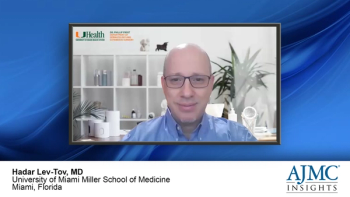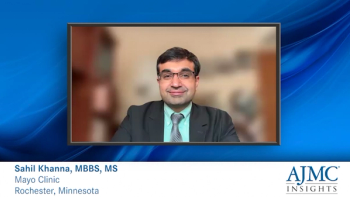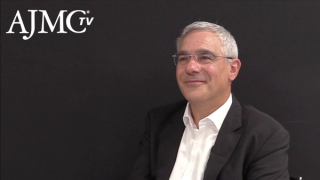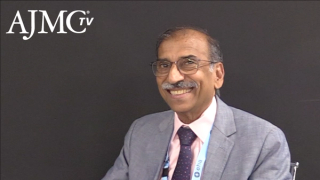
Clinical
Latest News

EMBARK 2: Delandistrogene Moxeparvovec Shows Sustained Benefits in DMD
Latest Videos
CME Content
More News

For this study, outcomes were compared between 2 groups of patients with myasthenia gravis: those who developed exacerbations and those who did not experience exacerbations.

Prophylactic cardiac treatment may prolong survival in Duchenne muscular dystrophy (DMD), but only one-quarter of individuals received such treatment, a recent study found.

Panelists discuss how distinct safety profiles among Bruton tyrosine kinase (BTK) inhibitors—including variations in cardiovascular effects, bleeding risk, infection susceptibility, and other adverse events—guide personalized treatment decisions in patients with relapsed/refractory chronic lymphocytic leukemia (R/R CLL) based on individual comorbidities and risk factors.

Panelist discusses how rapid access clinics could revolutionize HS patient care by providing swift, comprehensive diagnostic pathways, integrating multidisciplinary expertise, and enabling early intervention. Strategies for equitable access include telemedicine, mobile diagnostic units, community health worker training, sliding-scale pricing, and partnerships with local health care providers to overcome geographical and economic barriers in underserved regions.

Panelists discuss how Bruton tyrosine kinase (BTK) inhibitor selection in patients with relapsed/refractory chronic lymphocytic leukemia (R/R CLL) depends on key factors including prior therapy response, BTK C481 mutation status, comorbidities, drug interaction profiles, dosing convenience, and adverse effect considerations, with noncovalent inhibitors offering particular benefit for those with BTK mutations or intolerance to covalent agents.

Nearly half of patients with advanced ovarian cancer treated with first-line poly-ADP-ribose polymerase (PARP) inhibitors experienced recurrence in this real-world study, emphasizing the need for enhanced strategies to optimize postrecurrence treatment.

While higher patient-reported Psoriatic Arthritis (PsA) Impact of Disease questionnaire (PsAID-12) scores were associated with treatment escalation, physicians primarily relied on clinical assessments when making treatment decisions.

Panelists discuss how monitoring patients with iron deficiency anemia requires regular follow-up appointments to track laboratory values, assess symptom improvement (particularly fatigue), and evaluate treatment response while considering the impact of comorbid conditions, with adjustments to therapy made based on both objective markers and patient-reported outcomes.

Real-world analyses have confirmed the efficacy of the 2-drug regimen of dolutegravir and lamivudine in treating HIV, confirming phase 3 testing results.

Researchers identified a 15-year shift toward surgical de-escalation in gynecologic oncology, marked by fewer surgical interventions, increased adoption of minimally invasive techniques, and a greater focus on fertility preservation and sentinel lymph node procedures.

Waist circumference and waist-to-hip ratio show stronger links to colorectal cancer (CRC) than body mass index (BMI), a new study has found.

The panelist discusses how recurrent Clostridioides difficile infections represent a critical health care challenge, characterized by unmet needs in long-term prevention, microbiome restoration, and personalized treatment. The field is evolving toward precision medicine approaches, leveraging advanced diagnostics, innovative therapeutic modalities such as engineered probiotics and bacteriophage therapies, and comprehensive strategies that integrate microbial, immunological, and genetic insights to improve patient outcomes.

The panelist discusses how recurrent Clostridioides difficile infections are frequently associated with complex comorbidities including inflammatory conditions, immunocompromise, gastrointestinal disorders, and metabolic diseases. Management requires a nuanced, multidisciplinary approach focusing on tailored antibiotic strategies, immunomodulation, comprehensive diagnostics, and personalized treatment plans.

Artificial intelligence (AI) models, particularly artificial neural networks and machine learning, outperform traditional methods in predicting post–complete cytoreduction outcomes in patients with ovarian cancer, including overall survival, no residual disease, and postoperative complications.

The study demonstrated a poor prognosis overall for patients with acute myeloid leukemia (AML) who were previously treated with hypomethylating agents (HMAs) for myeloid neoplasms such as myelodysplastic syndromes.

Generalized myasthenia gravis (gMG) is an autoantibody-driven chronic disease for which there is no cure.

Panelist discusses how delayed medical diagnosis causes significant economic burden through increased treatment costs, prolonged health care interventions, reduced patient productivity, and higher health care system expenses. Economic mitigation strategies include implementing early screening programs, improving diagnostic technologies, enhancing medical training, and developing robust health care infrastructure that prioritizes timely patient assessment and intervention.

Charleston Area Medical Center (AMC) Vandalia Health was among 3 participants in the Association of Cancer Care Centers' Quality Improvement Program for myeloproliferative neoplasms.

Panelists discuss how strategic sequencing decisions in frontline CLL therapy, informed by new evidence from the Rhodes et al. ASH 2024 study, have downstream implications for managing treatment options in the relapsed/refractory setting.

Patients with diabetes and chronic kidney disease receiving physiologic insulin resensitization had much lower annual costs of care than similar patients not receiving it.

Besides Kent Hospital, the Association of Cancer Care Centers worked with Perlmutter Cancer Center at NYU Langone Hospital and Charleston Area Medical Center Vandalia Health in Charleston, West Virginia.

Panelists discuss how diagnosing iron deficiency anemia requires comprehensive laboratory testing of iron parameters alongside clinical assessment, emphasizing early detection to prevent complications in patients with common comorbidities like chronic kidney disease, heart failure, and inflammatory bowel disease, where coordinated treatment approaches must balance managing both IDA and the underlying condition.

High heat shock protein 60 (HSP60) expression in patients with ovarian cancer is associated with larger tumors, advanced stages, and worse survival outcomes, highlighting its potential as a prognostic biomarker.

This systematic review of real-world observational studies demonstrated the effectiveness of Janus kinase (JAK) inhibitors in improving treatment adherence, persistence, clinical outcomes, and patient-reported outcomes among US patients with rheumatoid arthritis.

Perlmutter Cancer Center at NYU Langone was 1 of 3 sites to take part in the Association of Cancer Care Centers quality improvement initiative in myeloproliferative neoplasms (MPNs).















